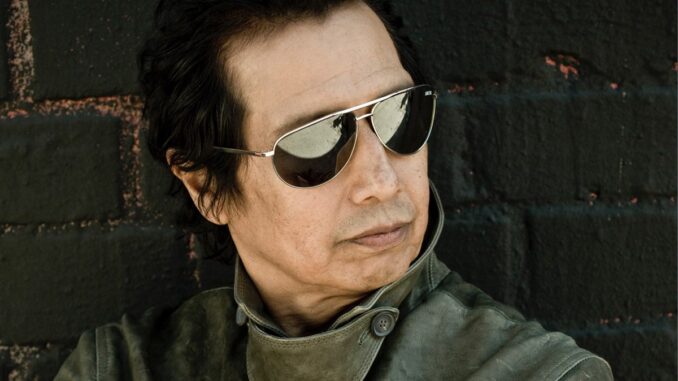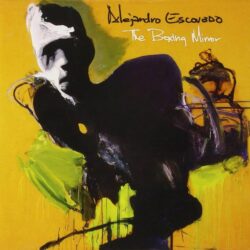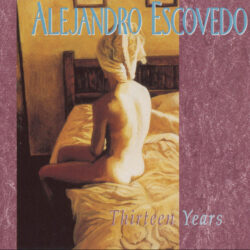
Alejandro Escovedo has been one of my favorite Austin-based musicians ever since I encountered his music in 1994. He remains the one performer I’ve seen live in concert more than any other (I lost count at around forty shows) and I love nearly all his discography of more than a dozen releases. There are only a scant few that I don’t reach for often. Escovedo’s 2001 CD “Man Under the Influence”, is considered one of his finest. And it is. But it still doesn’t make its way into my CD player much. Why? Because I heard live renditions of its songs so many times in concert and on bootlegs that by the time of official release, they seemed like old news to me. This hasn’t happened with any other artist or album, so I guess it’s a particular hazard of me being an uber-fan. Another disc that I tend to pass over is “By the Hand of the Father”, the soundtrack to Escovedo’s stage play about his Mexican American father’s journey to the United States. Of course, the music is stellar, but the stage concept doesn’t quite translate as a cohesive album. I wouldn’t call it Escovedo’s weakest work though.
Can’t Live With It: “The Boxing Mirror” (2006)
 I will admit, my recording engineering background may color my judgement, but Escovedo’s 2006 album “The Boxing Mirror ” is difficult for me to get through, despite its ambitious origins. Escovedo was excited to snare John Cale as the album’s producer. This seemed like a natural pairing since the influence of Lou Reed and the Velvet Underground is a constant presence throughout Escovedo’s music. One of the main subjects of “The Boxing Mirror” concerns Escovedo’s battle with Hepatitis C, which reached a critical peak when he collapsed onstage during a 2003 performance of “By the Hand of the Father” in Arizona. Cale’s avant-garde touch appeared the perfect complement to such an emotionally raw collection.
I will admit, my recording engineering background may color my judgement, but Escovedo’s 2006 album “The Boxing Mirror ” is difficult for me to get through, despite its ambitious origins. Escovedo was excited to snare John Cale as the album’s producer. This seemed like a natural pairing since the influence of Lou Reed and the Velvet Underground is a constant presence throughout Escovedo’s music. One of the main subjects of “The Boxing Mirror” concerns Escovedo’s battle with Hepatitis C, which reached a critical peak when he collapsed onstage during a 2003 performance of “By the Hand of the Father” in Arizona. Cale’s avant-garde touch appeared the perfect complement to such an emotionally raw collection.
‘Arizona’ kicks off their collaboration, a brooding ballad referencing the state and events where Escovedo had to “Turn my back on me” followed by the chugging string-backed rocker, ‘Deerhead on the Wall,’ a rousing set piece of Escovedo’s live shows at the time. On the former, Cale’s production is subtle, featuring quiet electronic effects fading in and out. The latter has an orchestral passage crowding into it, which should work but comes off strangely artificial sounding. This is the main problem with Cale’s approach on “The Boxing Mirror”. His unusual instrumental and sound mix choices often clash with the intended feel of the songs. The longing, wistful ‘Looking for Love’ is all set up as a lovely Velvet’s ‘Pale Blue Eyes’-inspired ballad but is knocked off course by watery electronic keyboards. ‘Died a Little Today’ employs a striking string arrangement that is much too far in the background and given an uncomfortable, unnatural sheen. Droning synths and ambient background vocals try too hard to add mystery to the already beautifully haunting ‘Evita’s Lullaby’. Worst of all is the electronic dance pop that is slathered over ‘Take Your Place’ which only makes its main riff all the more grating. The inclusion of the original punky version of the song as a bonus track almost serves as an apology for the dance mix. It may have seemed like an inspired match, but to my ears, John Cale only gets in Escovedo’s way on “The Boxing Mirror”.
Can’t Live Without It: “Thirteen Years” (1994)
 Like many favorites, it took me a while to grasp the character of Alejandro Escovedo’s 1994 album “Thirteen Years”. Every time I listened to it, my perception of the music would shift. One time the album would sound like a collection of moody string-backed ballads, and the next time it would come across like a bunch of Stones-like rockers. With the first ‘Thirteen Years Theme’, a gently plucked harp evokes the first rays of a morning sunrise and, sure enough, the opening lines in the next song ‘Ballad of the Sun and the Moon’ are: “The day started out like any other day/The sun rising/There was always the sun.” Escovedo’s lyrics are simple, precise sketches that create images by using a few direct words. These first few lines give you the feeling that you are about to start a new day and discover all that it has in store for you. You soon find out that the journey may be a dark one, however. “Can you hear the cannons and the fighting?” Alejandro asks. “Can you feel the soldiers and their marching? /They came, they took my sister away/They came and the took her away.” In the next song ‘Try Try Try’, a war continues in a more internal sense. As the bluesy melody stumbles along like a drunk trying to climb stairs, the narrator admits to his friend that he is “spinning ’round in circles” but swears he’s “gonna get it right” someday. His friend, who has obviously heard all this before, tells him “You can crawl across the floor till your knees do bleed/(But) there’s no dignity ’cause anyone can bleed”. You know this guy is going to be crawling and spinning in circles for the rest of his life.
Like many favorites, it took me a while to grasp the character of Alejandro Escovedo’s 1994 album “Thirteen Years”. Every time I listened to it, my perception of the music would shift. One time the album would sound like a collection of moody string-backed ballads, and the next time it would come across like a bunch of Stones-like rockers. With the first ‘Thirteen Years Theme’, a gently plucked harp evokes the first rays of a morning sunrise and, sure enough, the opening lines in the next song ‘Ballad of the Sun and the Moon’ are: “The day started out like any other day/The sun rising/There was always the sun.” Escovedo’s lyrics are simple, precise sketches that create images by using a few direct words. These first few lines give you the feeling that you are about to start a new day and discover all that it has in store for you. You soon find out that the journey may be a dark one, however. “Can you hear the cannons and the fighting?” Alejandro asks. “Can you feel the soldiers and their marching? /They came, they took my sister away/They came and the took her away.” In the next song ‘Try Try Try’, a war continues in a more internal sense. As the bluesy melody stumbles along like a drunk trying to climb stairs, the narrator admits to his friend that he is “spinning ’round in circles” but swears he’s “gonna get it right” someday. His friend, who has obviously heard all this before, tells him “You can crawl across the floor till your knees do bleed/(But) there’s no dignity ’cause anyone can bleed”. You know this guy is going to be crawling and spinning in circles for the rest of his life.
My favorite song on the album is ‘Way It Goes’, which could be viewed as an expansion of the friend’s point of view in ‘Try Try Try.’ Despite the title and the chorus of “that’s just the way it goes”, the song isn’t fatalistic at all. It begins by showing us a motherless child and a father who has lost his lover, two people who have obviously experienced a loss, then goes on to say that sometimes loss isn’t always as apparent. The old cliché of knowing that you have hit bottom in your life once you’ve lost everything doesn’t apply here. I think what Escovedo is saying is that there are some people living what look like normal lives but who are really lost souls, sometimes by their own choosing: “Throw a penny into the Indian ocean/And jump right in/Three wise men can tap you on the shoulder/You jump right in”. But one shouldn’t give up just because they are foolish enough to jump into the ocean. The last verse says, “You’ve made your choice now live with it/It’s all you’ve got. . .Well, that’s the way it goes”. Its folk melody lopes along like someone peacefully walking through life, yet the ambient guitar lines, played by Steven Bruton, wind around it as if they were barbed wire waiting to snare the person. Just like the unforeseen events in life. Well, that’s the way it goes. . . And that’s why I continue to love Alejandro Escovedo’s “Thirteen Years” so much.



Long overdue resume. Great stuff.